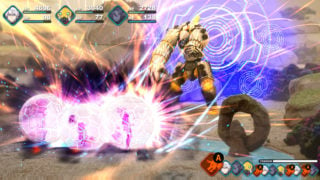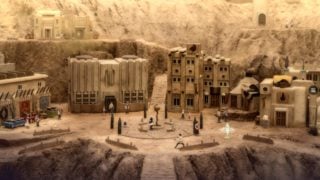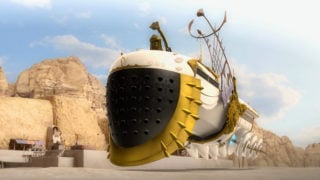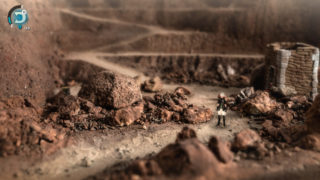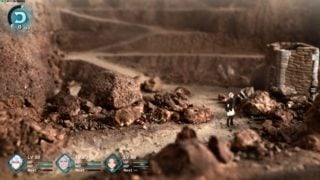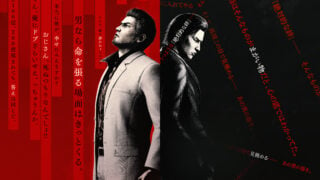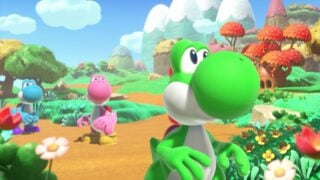Hironobu Sakaguchi interview: ‘I’m aging… so I made a game that returns to my roots’
The Final Fantasy creator discusses Fantasian, FF7 Remake and Mistwalker’s plans for the future

Mistwalker’s upcoming RPG Fantasian is shaping up to be an important title in a number of ways.
The impressive-looking iOS title is being produced by Final Fantasy creator Hironobu Sakaguchi, a 33-year veteran of the games industry, and has been in development for three years, longer than most mobile games.
As an Apple Arcade exclusive, it could also be one of the first truly high-profile games to arrive on the subscription service since it launched in September 2019. With its unique art style that uses real-life dioramas created by Japanese movie studio veterans, it promises to be a memorable experience.
Perhaps most importantly, though, as we discovered during our conversation with Sakaguchi, there’s a chance it may be his final game.
Sakaguchi has already suggested that Fantasian may be the last time his long-time friend and Final Fantasy collaborator Nobuo Uematsu composes a full soundtrack for a game. If this is also to be Sakaguchi’s last hurrah, Fantasian may be a defining moment in the genre, regardless of its quality.
We spoke with Sakaguchi via video from his Hawaii home to find out more about the game and his views on the industry in general.
With its turn-based battle system and its random encounters it seems clear that Fantasian is going back to your early works, most obviously the Final Fantasy games. Why have you decided to do this now?
One incident that triggered it was a little while ago, I want to say it was about three years ago. There was a project with Famitsu where some of the original creators of Final Fantasy VI and myself got together and played it.
That reminded me how much I really like this classic RPG genre, if you will, and from there it really brought me back to my roots and gave me this desire to make a game like that.
At the same time, I’m ageing quite a bit so I think the remaining number of projects I can do are quite numbered, and I wanted to be really honest with myself and develop a game that I really like and want to make in the same genre. So for better or for worse, I kind of ignored the current trends of what gaming is doing and really returned to my roots of game development.
Speaking of ageing, you’ve recently said that you think this may be the last time Uematsu-san composes an entire soundtrack for a game. If Fantasian does well and is considered a success, are you starting to feel like it may be time to retire too?
Yes, I think it is certainly possible that this could be my last project, and that was kind of in the back of my mind as we were developing it.
The backgrounds in Fantasian look incredible. Was working with an external studio to create real-life dioramas a more complicated process than just having artists on the team rendering them in the standard way?
It was certainly a very complicated and complex undertaking. Of course, when you’re crafting these diorama sets there really are no changes you can make, so we had to be very intentional with the level design and the blueprints of these dioramas before we actually engaged in crafting them.
Pipeline-wise, it was quite intricate and cumbersome – we had to 3D scan these dioramas that we’d crafted, then get the polygons and 3D model data from it, then on top of that we would projection map the photos we took of the dioramas onto the 3D models to give the exact diorama texture and make sure none of that was lost as we brought this into a 3D space and the game engine.
So I would certainly say that there were some technological pipeline challenges we had to overcome. Was it worth it? I think in the end we succeeded in creating this experience where players can explore this diorama world and feel and touch these textures.
The process of projection mapping also allowed it so that the camera wouldn’t just instantly cut from one angle to another, but we were able to more gracefully transition between different areas of the maps as the player traverses through them, so I think in the end we landed on a very good experience and place in terms of how the dioramas were able to translate the game.
“I’m ageing quite a bit so I think the remaining number of projects I can do are quite numbered, and I wanted to be really honest with myself and develop a game that I really like and want to make in the same genre.”
Mistwalker hasn’t made a console game for a decade (since The Last Story on Wii). Is part of this because the console market is declining in Japan, or was it just a personal preference to make a mobile game rather than a console one?
After we created The Last Story, I was wondering what we were going to do next. I was having dinner with a colleague of mine who worked at Famitsu and – I’m not sure if you’re familiar with the game Puzzle & Dragons, released by GungHo?
Well, the Famitsu person happened to be friends with the creator of Puzzle & Dragons, Yamamoto-san, and he said “oh, let’s invite him to dinner too, this’ll be fun.” So sure enough, he invited Yamamoto-san and we’re all talking and drinking and having a great time.
And I think at the time, the entire concept, or way of thinking when approaching a mobile game was completely different, and when I played Puzzle & Dragons it was just a huge shock to me. I knew the gacha system was going to be at the core like most mobile games, with the random loot boxes, but they crafted the game in such a way where it didn’t feel too gacha-driven and there was a lot to do, so that to me was eye-opening and a big shock.
So at that time I felt like I also wanted to challenge myself and that led to the first Terra Battle, which we developed with a team of just four people, and because it was on mobile that was possible. I think also working on something with a very small team had a sort of appeal to me as well, I thought it might be a bit fun. So a sort of string of events, I suppose, led me to that mobile space.

With Sony closing down its Japan Studio, are you concerned by the Japanese console scene at the moment?
To be perfectly honest with you, I haven’t been following the so-called ‘mega trends’ in the console industry with respect to Japan.
What I can say, I suppose, is that a lot of the people who are close to me who are much more involved in the console market, I watch them work their craft in the industry and I suppose there isn’t much cause for concern from what I can see.
So, for example, [Yoshinori] Kitase, who is in charge of the Final Fantasy VII remake, they seem to be working really hard to push the boundaries of visual expression and fidelity, and they recently announced Final Fantasy XV.
So my colleagues closest to me who are more involved in the console market seem to be doing rather well – the Nier team also seem to be doing really good, and are trying hard to work on their game – so whenever we dine or hang out and I hear their stories they’re really pushing that console hard.
Maybe I’m just looking at a small slice of it but it doesn’t seem as grim as perhaps the news makes it sound, or maybe it’s just the people I’m interacting with.
When Mistwalker was founded, the studio started off with a couple of Xbox 360 exclusives in Blue Dragon and Lost Odyssey. Xbox has been quite open about looking to acquire a Japanese studio. If Xbox was to approach you, would you be interested in entertaining an offer?
Obviously, Fantasian is a multi-part experience and the second part is still coming later this year for Apple Arcade, so we’re developing the final touches for Part 2 of Fantasian, and things are finally beginning to calm down, I would say.
To be perfectly honest with you, I haven’t given much thought to the next steps for the company or where we want to go, and I think I could use a bit of vacation time in between now and whatever it is we do next. So we’ll see what happens, it remains to be seen.

When we were developing Fantasian I didn’t really look at the current market trends or what the RPG market was doing. The sort of feeling I guess, for me, was going back to my roots, as I mentioned earlier with the story about Final Fantasy VI.
This game to me feels almost like an extension of Final Fantasy VI with the respect to some of the story elements and how things flow, and it was just an honest ‘whatever comes from within me I want to put that into the form of a game’ type of exercise if you will.
So when the players actually get their hands on it, whether they’re going to feel nostalgia, or how it’s going to be perceived, wasn’t really on my mind so much as “this is the type of game I wanted to make”. So I don’t know if that answers what the other [studios] are doing, but that’s at least our approach.
As you say, Final Fantasy VI is clearly an inspiration for Fantasian. Was it easier making games back then, or is it easier now?
Certainly, there’s always going to be changes in development environments. Even when you take Fantasian, although we are using diorama sets as backgrounds we’re still scanning that and turning them into 3D data, projection mapping, and so there’s a lot of newer technology involved in this.
So I suppose that enables us to do certain things but in terms of comparing the two… I’d say there are always elements that aren’t going to change. For example, attention to detail is one that comes to mind.
Whether it was back making Final Fantasy VI or making Fantasian now, let’s say the player is going into a new town and they explore, and they find this alley, they go to the end of the alley and jump through something and they’re rewarded with a chest… that sense of exploration and discovery, I think, is really what brings that sense of joy, that attention to detail. So we’ve always definitely been aware of that, whether it was Final Fantasy VI or Fantasian
“When we were developing Fantasian I didn’t really look at the current market trends or what the RPG market was doing. The sort of feeling I guess, for me, was going back to my roots, as I mentioned earlier with the story about Final Fantasy VI.”
You briefly mentioned the Final Fantasy VII Remake earlier. Obviously, you were involved in writing the initial plot for the PlayStation original, but do you have an opinion on the changes that were made to the remake?
My style of development, be it Fantasian or any of the games I’ve worked on in the past is this – whether it’s the concept of the game, or the story, or any individual lines of dialogue, I’m not the be-all and end-all decision-maker. There’s a lot of people involved in the team and each one of those team members will contribute their own ideas, and I think they all have a slightly different image of what the game should look like and what it should feel like.
I love hearing those ideas and a lot of the ones we’ve integrated, whether different from my original concept or not, generally has improved the game in my experience. I think that methodology of making games by letting people bring their opinions to the table really is a positive one.
So with the Final Fantasy VII Remake, Kitase-san is of course spearheading that project, and I think he had his own interpretation of what Final Fantasy VII should be. So the places or areas that needed to be adapted or changed for more modern expression, versus the areas that needed to be kept intact or ‘protected’ if you will, it’s up to him to find that right balance for the Final Fantasy VII Remake.
And needless to say, the visuals are a huge, huge change, so there’s a lot of interpretation there as well. So I think the remake, although it is a remake, is still Kitase’s game, and I really look forward to seeing where he decides to take the direction of it next.

Going back to Fantasian, the game is split into two parts. Other than the plot, how are these parts going to differ? Will there be any new gameplay mechanics in the second part, or is it literally just a case of splitting the story in two?
The biggest difference, I would say, is that in Part 1 the game is a little bit more narrative or story-driven, whereas in Part 2 it’s a little more quest-driven so the player is able to pick up whatever quest they want and go tackle those one at a time.
So I think there’s a big shift in the flow of the gameplay cycle, if you will. In Part 2 of course, your characters by then have presumably levelled up and grown quite a bit, so there are some changes and new elements in the battle mechanics, but I can’t go into too much detail about that at the moment.
So does that mean progress in Part 1 carries onto Part 2, so they’re not being treated as completely separate apps? So save data from the first part will carry onto the second one?
Certainly, the story is connected and the gameplay is going to be seamless so it’s really just picking up where you left off.
The Last Story on the Wii has something of a cult following. Once both parts of Fantasian have been released, do you have any interest whatsoever in remastering or remaking it, or even other Mistwalker games like Blue Dragon or Lost Odyssey?
To be perfectly honest, there aren’t any plans for any remakes at the moment. Although they’re called remakes, the amount of effort and resources it would command means the difference is basically nil between [developing] a remake versus a completely new game, and I would personally find myself more attracted to the idea of coming up with another original story or world, or building something new.
Finally, if we can go all the way back 33 years to the original Final Fantasy… obviously we all now know that it was called Final Fantasy because if it didn’t sell well you were considering leaving the games industry. In an alternate universe, where Final Fantasy was a flop and you were facing the thought of leaving the industry in 1988, what do you think you’d be doing now?
[laughs] Oh ho ho! [long pause]
Had I still stuck around in the games industry, I imagine I would still be making games or working hard to put something together, but maybe not at the same scope I do now.
Had I just said “nope, that’s it, I’ve had it with the games industry” and left, originally I really wanted to do something more in the music industry and I thought it would be great if I could make a living doing something related to music, so perhaps I could be working with Uematsu-san – or should I say working under Uematsu-san, as his recording engineer in his studio! [laughs]
